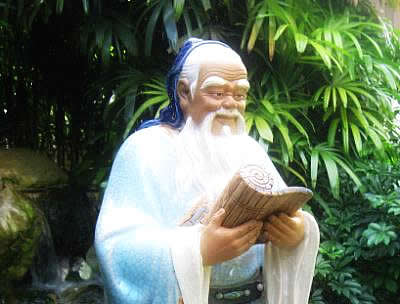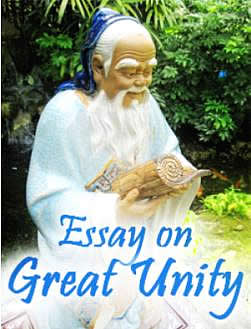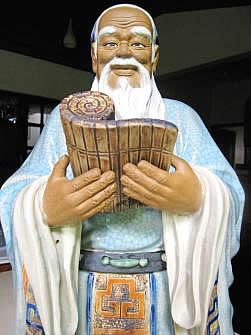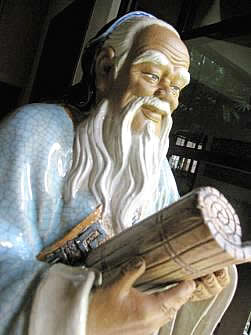The virtuous and the able are chosen for public office. When we choose the leaders for our country, we must choose people with virtue, ability, wisdom, and appropriate expertise. People like that will seek happiness for living beings and work to make the country affluent and strong.
Trustworthiness and friendliness are valued by all. This means dealing with neighboring countries in a trustworthy manner, getting along in a friendly way, and not cheating each other. It means making our actions consistent with our words. In that way, there will be no trickery; harmony will exist among people, among families, and among countries. Everyone will be concerned with justice, not with advantages and disadvantages. At that point there naturally won't be any wars.
People not only love their own parents and children but love parents and children of others as well. Because there is no partiality, people can all treat one another with care and affection. They will be filial not only to their own parents, but to the parents of others as well, like the saying goes: "Care for your own elders and extend the same care to the elders of others." Take the same heart that you have when serving your own parents and extend it to helping serving the parents of others, making them happy as well. Love not only your own children, but the children of others as well. It is said, "Look after your own children and extend the same concern to the children of others." Take the heart that you have when educating your own youngsters and extend it to helping educate the youth of others, enabling them to acquire knowledge as well.
The elderly live their last years in happiness. Even today there are retirement communities and nursing facilities that provide excellent care to the elderly and make them happy. A society that takes the elderly into consideration will allow old people to enjoy their last years without impediments, worries, or afflictions. That will give them the best possible situation in which to die in a natural way, which in turn will enhance their prospect of getting reborn in the Western Land of Ultimate Bliss.
Able-bodied adults are usefully employed. Young people with strong bodies must work and serve the society, and do their best to contribute to their country. They should not live on social welfare or unemployment benefits, because those cause them to become a great burden to society. People should work hard and maintain order in society, and not idly hang around or cause trouble within the country.
Children are reared properly. Young children should be taught how to be filial to their parents, how to be loyal to their country, and how to fulfill their duties faithfully. Children growing up with that kind of education will surely be fine citizens in the future.
Widowers, widows, orphans, the childless aged, the handicapped and the ailing are well cared for. Confucius is advocating kindness and compassion toward, love and protection of, and sympathy for six kinds of people who suffer misfortune: widowers, elder men who whose wives have passed away; widows, elder women whose husbands have passed away; orphans, children who have no parents to care for them; childless seniors, elders who have no family; the handicapped, people with physical or mental hindrances; and the ailing, people who have chronic or acute illness. Those six kinds of people are the most unfortunate ones in the world. In is ideal society that Confucius advocates, these people would be able to live secure and peaceful lives, free from any threats to their psychological or physical well-being. Their lives would be protected. The government would set up various institutions to take them in and provide them with proper care.
All men share their social responsibilities. Men have their duties, positions, and responsibilities. They should fulfill their obligations to their families and their country. They cannot be lazy or become deadbeats.
All women have their respective roles. Women who have families should assist their husbands, teach their children, and be able wives and good mothers. Those are the duties of women. Everyone is content with his or her position and role, and doesn't try to change it or abuse his or her rights. Men are in charge of external affairs and women of domestic affairs. Men and women shouldn't fight with each other for their rights. They should each have their respective responsibilities and rights.
Chinese culture exhibits a preference for men and women who are unrelated to keep their distance. In order to avoid suspicion, men and women should not casually chat with each other. In this context, an adage advises: "Never bend down and put on your shoes in the middle of a melon patch; never get up and touch your hat while standing underneath a plum tree." In order to maintain propriety, men and women should keep some distance between each other. Another piece of advice: "Brother and sister-in-law should not give or receive things from each other; children should not walk side by side with adults."
Natural resources and commodities are not wasted. We should conserve natural resources, food supplies, and other things we use. We should not squander food or waste commodities. Countries with a surplus of agricultural produce should not dump the excess in the ocean, or burn it, or otherwise destroy it. To do so is to waste natural resources, which will surely bring a retribution in the future.
Or appropriated for selfish ends. Commodities should be circulated, not hidden for selfish ends, hoarded for higher prices, or monopolized. There should be fair trading of commodities. One country should exchange its surplus goods with other countries to get the things it lacks. That is benefiting both self and others. Isn't that a positive thing to do? If we refuse to trade, it is the same as wasting goods or appropriating them for selfish ends.
People want to contribute their strength and ability to the society for public good. We should not consider the knowledge and skills we have learned to be for our own use. Instead, we should use what we know and what we are able to do to serve the people of the world. To apply our education in that was known as learning that is put to good use.
Not for private gain. We should never scheme for ourselves. The plans for our lives should not be made just for ourselves; they should include all living beings. We must have this spirit of devoting ourselves to others; that is a basic principle of being a person.
If all of the above prevailed, then people would be frank with each other and would not scheme or fight against each other either openly or covertly.
Deception and cheating cannot occur in such a society: There would be no more deception. The door of fighting and cheating would be closed. Dishonest tactics to cheat people of their money would not be used. Such improper conduct would no longer exist.
Robbery, larceny, rebellion, and other crimes all disappear. To take something by force is robbery; to steal it covertly is larceny; uprising against the government is rebellion. When there is unfairness, such as one person having things another one doesn't have, robbery and larceny will occur. If everyone lives secure and peaceful lives, with adequate food and clothing, then robbery and larceny will naturally disappear. People revolt when there are famines and they don't have enough to eat. When it is impossible to make a living, when nine out of ten houses are deserted because their occupants have been forced into homeless wandering, then the misery people suffer is unspeak¬able. Thus the saying: "The winner becomes a king; the losers become bandits.” Given those circumstances, people will rebel. But if everyone were employed and well fed, rebellion would naturally disappear.
Gates and doors are not locked. If such an ideal society were to prevail, then there would be no internal troubles and no external calamities. Everyone would abide by the law. In such a social climate, no one would take things belonging to others, even if they found something lying in the street. Since no one would think of stealing, doors and gates would not need to be locked at night. In such a social climate, even the weather becomes temperate and the whole country becomes safe and peaceful.
This is a world where harmony, equality, and justice prevail. No one will be selfish or pursue personal advantage. Everyone will be honest, just, happy, and friendly, and so the world will be peaceful.






